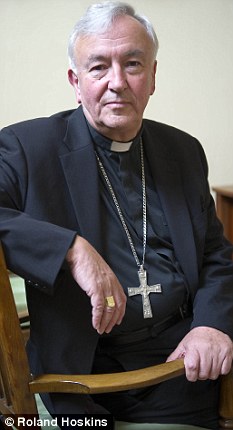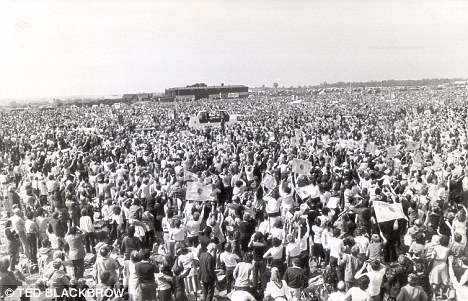By Andrew Pierce And Amanda Platell
Daily Mail
September 11, 2010
http://www.dailymail.co.uk/news/article-1311028/Britains-Catholic-clergyman-I-forgive-priests-shamed-Church.html?ito=feeds-newsxml
 |
| Revealing: Archbishop of Westminster, Vincent Nichols |
Every morning he rises at 6am to pray.
Yet Vincent Nichols, the 64-year-old leader of the Catholic Church in England and Wales, is not looking for celestial inspiration for next week’s Papal visit.
He says: ‘I am not anxious. I trust the Lord. It will be a wonderful few days.’
But the four-day visit by Benedict XVI, which begins next Thursday, has triggered fierce criticism because of the Pope’s ‘inadequate’ reaction to the scandal of paedophile priests.
The abuse revelations have created the worst crisis in the Church’s recent history, and the Archbishop of Westminster is candid about its impact.
He says: ‘It is the most difficult thing in my lifetime. The abuse of children is the most hidden of crimes. It is profoundly devious.
'It is so difficult to understand. It takes enormous courage to break the circle of silence, especially for the victims.’
The Archbishop, who was ordained in his home city of Liverpool in 1969, was himself taught at school by the Christian Brothers, who were responsible for many incidents of abuse in Ireland.
However, he has no recollection of anything similar during his training.
Dressed in simple priestly black, which neatly contrasts with his thick mane of grey hair, his voice still has a soft Mersey lilt. He says his views were fashioned by his father, a teacher who made the distinction between respect for the office of the priesthood and that of the individual.
Despite conceding ‘priests are human beings and are prone to fail like everyone else’, Nichols takes a strong moral line. While the Church teaches that God forgives all sinners, he says forgiveness over the paedophile scandal is difficult.
‘One of the things I have learnt is to be automatically less trusting of what people — and that includes the priests — say to me on this issue.’
So does that entail forgiveness? ‘As long as I can sit down with a guilty priest and talk to him in a way that I know is honest and know he fully accepts what he has done and what the consequences are.’
what about those priests who refuse to admit what they did? Nichols explains: ‘It is just not possible (to forgive them). It can’t be done unless there is a confession of guilt and sin.’
But, of course, the problem is not just about an admission of guilt. There is also the longterm psychological damage done to the abusers’ victims.
The Archbishop has spent a lot of time with some of them. He says: ‘It is very hard for someone who has not been through the experience to know how deeply it cuts through the essence of being human.
 |
| Impending visit: Pope Benedict XVI will spend four days in Britain |
'It cuts through the ability to trust, to love, and the sense of self. It is difficult to move on from being a victim.’
He hopes his candidness will start to appease the critics of the Pope, who is due to meet some of the now grown-up victims during his trip, although he is not expected to make a direct apology for the abuse scandal.
But there is another controversy where the whole question of forgiveness is still at issue: the last Labour government’s gay rights laws that forced all adoption agencies, including Catholic ones, to assess same-sex couples as prospective parents as well as heterosexuals. These ran counter to the Church’s beliefs.
The change of law meant that the Catholic Children’s Society, whose president is Vincent Nichols, stopped finding potential homes for children because it could not reconcile Church teaching (that children must be brought up by a married man and woman) with Harriet Harman’s Sexual Orientation Regulations.
Nichols’ principled public opposiption to the legislation was seen by some as a factor in his appointment to the most senior job in the English and Welsh Catholic hierarchy following the resignation last year of Cormac Murphy-O’Connor as Archbishop of Westminster.
He is still very angry. ‘Some of those Catholic adoption agencies had been running for more than 100 years. They had a wonderful reputation and dealt with some of the most difficult situations.’
Nichols accuses the last government of being ‘short-sighted’ and is worried about the law’s effect on adoption levels, pointing out that although the Catholic adoption agencies only constituted seven out of the country’s 400 such organisations, they were responsible for half of the 500 children placed with new families every year.
Having lost that fight — ironically to Prime Minister Tony Blair, who proceeded to become a Catholic after leaving Downing Street — the Archbishop is now engaged in another battle to ensure the success of what is only the second ever papal visit to Britain.
Apart from the row over paedophile priests, there has been much unhappiness that taxpayers are footing half the ?20 million bill for the visit.
While the militant atheist Richard Dawkins has said he might try to organise a ‘citizen’s arrest’ of the Pope for ‘crimes against humanity’, some Catholic clerics have privately questioned whether the trip is a good idea in view of the bitterness felt over Benedict XVI’s reluctance to deal with a known child-abusing priest in the early 1980s when he was Archbishop of Munich.
 |
| Crowded: The last papal visit in 1982 saw 200,000 attend an open air mass |
The challenge is made harder by the fact that the last Pope to visit Britain, in 1982, was John Paul II — one of the most influential figures of the 20th century and a brilliant communicator, who helped to destroy Communist rule in his native Poland.
By contrast, 83-year-old Benedict is introverted, cerebral and doesn’t have the same energy of John Paul II, who was aged 62 at the time of his British visit.
Nichols acknowledges the differences: ‘John Paul was a master of stage craft. He could command a huge audience. Pope Benedict is a master of word craft. He will speak in a way which is more accessible and more to the heart.’
One of the highlights of the Pope’s visit will be an open-air mass.
In the Church’s advance literature for the trip, the ceremony was scheduled to take place at Coventry Airport — where John Paul preached to 200,000 people in 1982.
But the venue has been shifted to the 80,000-capacity Cofton Park in Birmingham — leading to suggestions that the organisers wanted to avoid embarrassment because they feared they could not fill the Coventry site.
The Archbishop dismisses such claims, saying the organisers had learnt the lessons of John Paul’s visit and wanted a more intimate event.
‘Some people felt that he was too remote a figure at the Coventry mass.’
The visit has also caused tension with the Church of England, after the Pope outlined proposals which were seen as a bid to tempt those Anglican priests with concerns about the increasing number of women being ordained in the Church of England to switch to Rome.
 |
| Wounds: Victims of sexual abuse by priests outside London's Vatican Embassy |
Dr Rowan Williams, the Archbishop of Canterbury, was given only a few days’ notice of the plan. But Archbishop Nichols is keen to defuse any potential row.
‘We are one family. This is not a recruiting drive,’ he says. ‘The values of this country are not served by a weaker Church of England. We want to be robust partners.’
He insists the initiative actually came from disillusioned Anglicans.
‘They were knocking at our door saying: ‘How can we do this?’’ ’
Indeed, while Sunday attendances in Anglican churches are falling, the parallel decline in Catholic Church congregations has been halted and attendances now stand at around one million.
Archbishop Nichols says: ‘ Catholic parish life is in good heart — invigorated by people coming here from many different countries such as Poland and the Philippines.’
Yet despite this renaissance in Catholic church-going, the Archbishop worries about another challenge — the effect of the September 11 terrorist attacks by Islamic extremists on the public’s attitudes towards all religions.
Sitting in his office surrounded by a handful of religious objects (including a picture of St Francis of Assisi, the patron saint of animals, and a wood carving of the Last Supper which came from Bethlehem), he says: ‘Since the attack on the World Trade Towers there has been a shift in attitudes to religion.’
He explains that religious faith was suddenly ‘seen as a problem. All religious faith got tarred with the same brush.
‘I hope the Pope might help us to see that faith is not a problem to be solved — but one to be discovered.’
Any original material on these pages is copyright © BishopAccountability.org 2004. Reproduce freely with attribution.